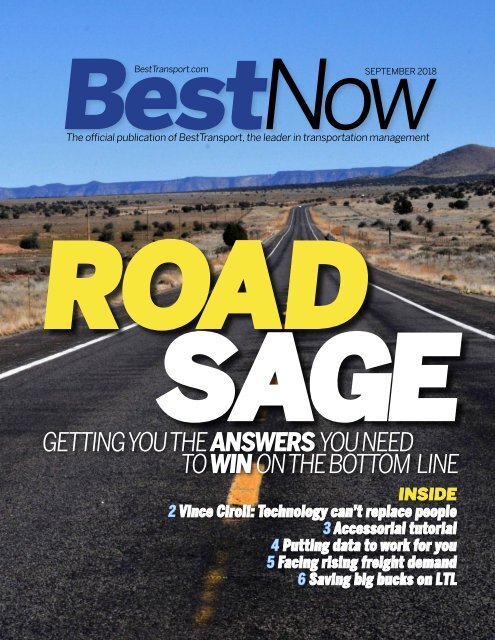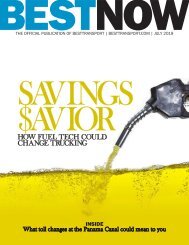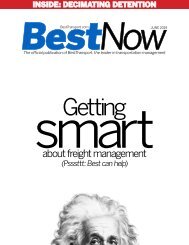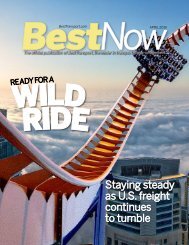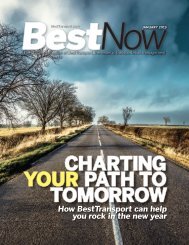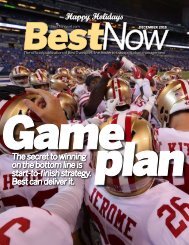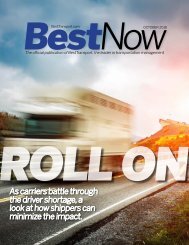BestENews0918
You also want an ePaper? Increase the reach of your titles
YUMPU automatically turns print PDFs into web optimized ePapers that Google loves.
BestNow<br />
The official publication of BestTransport, the leader in transportation management<br />
BestTransport.com<br />
SEPTEMBER 2018<br />
ROAD<br />
SAGE<br />
GETTING YOU THE ANSWERS YOU NEED<br />
TO WIN ON THE BOTTOM LINE<br />
INSIDE<br />
2 Vince Ciroli: Technology can’t replace people<br />
3 Accessorial tutorial<br />
4 Putting data to work for you<br />
5 Facing rising freight demand<br />
6 Saving big bucks on LTL
PORT OF ENTRY WITH CO-FOUNDER VINCE CIROLI<br />
Human touch<br />
still required<br />
If to err is human, then how do we correct<br />
the “human err”?<br />
While we would like to think we are so<br />
advanced that we have an app that will do<br />
that — well, that generally is not the case.<br />
Yeah, the Waze app might warn us of<br />
a wreck ahead and even route us in a different<br />
direction, but what happens when that technology<br />
takes us off the interstate and leads us smack in the<br />
middle of a No-Go Zone where your life expectancy<br />
can be measured with a watch?<br />
While technology has delivered many wonderful<br />
things, it has not gotten to the point of replacing<br />
humans and human management.<br />
While we are seeing many advances in Artificial<br />
Intelligence (AI), the day of turning over the transportation<br />
department fully to a computer might be<br />
many years in the future.<br />
This is not to say that computers can not help us<br />
to better outcomes. They can. Computers can help<br />
us sort and analyze data faster and better than at<br />
any time in the past.<br />
But we still need the human element.<br />
Data big and small help use create better programs<br />
via algorithms.<br />
I was first introduced to algorithms over 60 years<br />
ago by my grandmother. The word “algorithm”<br />
was first used by Persian mathematician Abu<br />
Abdullah Muhammad in the ninth century and the<br />
word “computer” much later, in 1613. I’m sure my<br />
grandmother was not familiar with either word but<br />
nonetheless taught me about algorithms. She called<br />
it a “recipe!”<br />
Algorithms are much like my grandmother’s<br />
recipe: If something changes just a little bit, it can<br />
change the taste (expected outcome).<br />
So, just like recipes, data need to be continually<br />
watched and managed to achieve the best possible<br />
outcome.<br />
As you will see as you read the articles in this<br />
month’s magazine, the “Human M” in TMS is critical<br />
if you are to constantly and consistently manage<br />
your freight spend dollars.<br />
2 best now<br />
J. Scott Cummans<br />
President and CEO<br />
Reo B. Hatfield<br />
Chief Operating Executive<br />
Deborah (Chesnick) Llaneza<br />
Vice President, Professional Services Group<br />
1103 SCHROCK ROAD, SUITE 100, Columbus, OH 43085 | (614) 888-2378 | BestTransport.com
MAIN FRAME<br />
Accessorial tutorial<br />
Best’s LTL program can ensure you cash in on shipping efficiency<br />
Accessorial fees are one of many<br />
factors affecting LTL rates. These<br />
include charges applied when additional<br />
services are required to<br />
handle a shipment. These fees<br />
are often applied and assessed after shipping,<br />
making them difficult to anticipate and budget.<br />
Base rates represent the largest<br />
portion of LTL freight costs, but<br />
accessorial fees easily can add up,<br />
leading to a significant increase in<br />
total transportation expense. It is<br />
critical to understand the impact<br />
of accessorial fees. The more you<br />
understand about how these fees<br />
are determined and calculated<br />
the easier it is to find ways to reduce<br />
or waive them altogether.<br />
Here is a list of common LTL<br />
accessorial fees and what you can<br />
do to reduce or avoid them:<br />
Fuel surcharges: These are<br />
the most common and typically<br />
are included on every shipment.<br />
This additional charge is due to<br />
excessive costs of diesel fuel and<br />
is applied as a percentage based<br />
upon indices published by the<br />
feds. These surcharges vary by<br />
carrier, 3PL or broker, so remember<br />
to check total net costs when<br />
doing comparisons.<br />
Lift-gate service: Lift gates<br />
enable carriers to lift and lower<br />
shipments from the ground to the<br />
truck and vice versa. This service<br />
often is required when the shipping<br />
or receiving site lacks a loading<br />
dock. Since this equipment<br />
costs carriers money, an additional<br />
charge is required. The cost<br />
can vary widely by carrier.<br />
Oversized freight: Most<br />
shipment pieces equal to more<br />
than 12 feet in length require<br />
more space and can create additional<br />
accessorial fees. Each carrier<br />
has its own rules on the size,<br />
skid count, lineal feet or capacity<br />
rules. Check your carriers’ rules<br />
tariffs or contact Best.<br />
Reweigh and inspection: If<br />
the carrier suspects (or hopes) the<br />
weight or classification of your<br />
freight is inaccurate, it will charge<br />
a fee to reweigh and re-class the<br />
shipment. See our story on weigh<br />
and inspection fees<br />
Limited access pickup: Carriers<br />
may also charge fees when<br />
they pick up or deliver shipments<br />
at limited access areas such as<br />
schools, prisons, military bases,<br />
convention centers, construction<br />
sites, airports or piers. These<br />
fees can be negotiated depending<br />
upon your situation.<br />
Additional services: There<br />
are many other instances when<br />
carriers add an accessorial charge<br />
such as “inside” a building to<br />
pick up or deliver a shipment,<br />
collecting (“COD”) the sale price<br />
of goods shipped and notifying<br />
consignees before making a delivery.<br />
Additionally, be aware of<br />
single shipment charges for only<br />
picking up one shipment that is<br />
usually less than 500 pounds.<br />
Carriers generally publish complete<br />
details regarding all their<br />
accessorial fees in a “Rules Tariff”<br />
and make it available on their<br />
website or upon request. These<br />
“rules” vary among carriers.<br />
Reducing and waiving LTL<br />
Accessorial Charges<br />
Accessorial charges can be<br />
tricky, complicated, difficult and<br />
time-consuming to manage.<br />
Every week, we see companies<br />
paying tens of thousands of<br />
dollars in unnecessary accessorial<br />
charges, which add billions of<br />
dollars in profit for LTL carriers<br />
and subtract that amount from<br />
the shippers’ bottom lines.<br />
So, we have two suggestions:<br />
1. Track, measure and record<br />
the characteristics, dimensions<br />
and weight of your LTL freight<br />
shipments. Make sure your transportation<br />
department knows and<br />
understands the tricky rules tariff<br />
language in all LTL contracts<br />
2. Use an experienced and<br />
qualified provider like BestTransport<br />
Professional Services Group<br />
to analyze and audit your freight<br />
invoices and negotiate rates and<br />
accessorial fees with carriers.<br />
BestTransport’s PSG can recover<br />
past accessorial fees paid over the<br />
past two years and do so at no risk<br />
to the shipper.<br />
Our PSG LTL experts have<br />
helped companies save on their<br />
LTL freight spend for years.<br />
Additionally, our Professional<br />
Service Group LTL experts can<br />
provide you with a no-obligation<br />
freight analysis showing you the<br />
potential savings using our LTL<br />
Saving Program.<br />
Email us at PSG@besttransport.com<br />
september 2018 3
OPEN TOP<br />
Putting data to<br />
the smartest use<br />
BestTransport’s Professional Services Group<br />
can ensure you find real solutions to problems<br />
Why have a transportation<br />
Management System (TMS)?<br />
At first this might seem like a<br />
silly question, but the answers<br />
you get from different parties<br />
might surprise you.<br />
Or if you already have a TMS, you might ask the<br />
question a little differently…<br />
Why do we have a TMS?<br />
Well, a Transportation Management System<br />
(TMS) helps organize information in a clean, easyto-understand<br />
format that allows shipping managers<br />
to make the best and most efficient decisions<br />
possible — automatically.<br />
And many of these<br />
systems take contract<br />
information that was<br />
previously in a file<br />
cabinet and organize<br />
it into a simple list<br />
that can automatically<br />
tender load and route<br />
information to the<br />
best carrier according<br />
to price or pre-determined<br />
rules.<br />
However, Transportation<br />
Management<br />
Systems can do much<br />
more than simply provide rate information. They<br />
can collect data points that become critical in managing<br />
to better and better outcomes. This wealth of<br />
information is incredibly valuable but only when it<br />
is parsed into a form that can be used effectively.<br />
The challenge for Transportation Management<br />
System developers such as BestTransport is to find<br />
effective ways to help shipping managers understand<br />
and interpret the wealth of data and turn that<br />
information into actionable processes that drive a<br />
4 best now<br />
As more and more data<br />
become available, the<br />
question becomes, which<br />
data are the most useful.<br />
Data that are difficult to<br />
navigate, sort or understand<br />
can be useless.<br />
better financial outcome.<br />
At BestTransport we believe this is so important<br />
that we have a separate division, Professional<br />
Services Group (PSG), organized around experts<br />
who have a combined 300-plus years of real world<br />
experience, dedicated to working with shippers and<br />
carriers finding real solutions to real problems.<br />
TMS: More than a transaction tool<br />
As more and more data become available, the<br />
question becomes which data are most meaningful<br />
and useful? In determining meaningful and useful<br />
data, it is critically important to understand the<br />
building blocks behind the data. Without understanding<br />
the details, it becomes difficult to make<br />
better business decisions<br />
or improve business<br />
practices.<br />
How are the data<br />
provided?<br />
This goes back to the<br />
old “garbage in/garbage<br />
out.” How are the data<br />
created? Is the process<br />
automated or supplied<br />
manually by end users?<br />
Is it a judgment call in<br />
areas such as LTL classification,<br />
definition and<br />
estimations? In analyzing results, it is important to<br />
fully understand the initial forming of the data to<br />
provide both control mechanisms and specific and<br />
consistent rules of engagement.<br />
Making better business decisions<br />
The top-of-mind question on data should be<br />
“Does it help me?”<br />
More data, and even more accurate data, are not<br />
necessarily the answer all the time. Data that are<br />
CLICK HERE TO EMAIL THE PROFESSIONAL SERVICES GROUP
FIFTH WHEEL<br />
difficult to navigate, sort or<br />
understand can be relatively<br />
useless.<br />
Usefulness many times is<br />
organization or facility specific.<br />
The methods of evaluating<br />
metrics or developing key<br />
performance indicators vary<br />
significantly from company to<br />
company.<br />
This is especially true if the<br />
results of the data are derived<br />
from a cookie-cutter approach.<br />
The information might not be<br />
helpful to the specific evaluations<br />
a company requires.<br />
Proper expectations should<br />
be set regarding the reporting<br />
requirements. These should<br />
include the exact analytics<br />
needed, the timing of report<br />
generation and parties within<br />
an organization responsible<br />
for collaborative evaluation of<br />
the data.<br />
At BestTransport, our Professional<br />
Services Group works<br />
closely with all management<br />
levels to develop individualized<br />
useful and actionable<br />
reporting.<br />
Additionally, reporting<br />
needs to be done and presented<br />
in a manner that speaks<br />
specifically to company objectives<br />
and initiatives, producing<br />
performance indicators<br />
specific to department and<br />
management responsibilities<br />
at all levels.<br />
Check it out<br />
To learn more about<br />
how BestTransport’s Professional<br />
Services Group<br />
can help you manage to<br />
better financial outcomes,<br />
even if you are<br />
not using the BestTransport<br />
TMS, please email<br />
PSG@BestTransport.<br />
Facing freight’s<br />
rising demand<br />
Surprises are as abundant<br />
as the miles in<br />
the world of freight,<br />
but there’s little that<br />
could not have been<br />
foreseen in the current state of<br />
things.<br />
Drivers are too few. (Nothing<br />
new there.) Rates are too high.<br />
(Not exactly shocking.) Truck capacity<br />
is too low to match freight<br />
demand. (Heard it all before.)<br />
Regulation hovers menacingly<br />
over it all, the latest wrinkle the<br />
heavily anticipated hard enforcement<br />
of the new federal requirement<br />
for cabs to be rigged with<br />
electronic logging devices.<br />
It all adds up to possible shipping<br />
delays and even steeper rate<br />
increases, industry insiders say.<br />
“This is something we have<br />
been anticipating,” explained<br />
BestTransport Chief Operating<br />
Executive Reo B. Hatfield.<br />
“When you add increased regulatory<br />
burden to a driver shortage,<br />
you have to expect impact from<br />
that.”<br />
There is plenty of good news<br />
gleaming amid the trends. The<br />
bellwether Cass Freight Index<br />
for shipments increased almost<br />
12 percent and spending rose at<br />
a nearly 16 percent clip year over<br />
year in the spring. These were<br />
indicators the U.S. economy was<br />
hitting the gas on growth.<br />
But the wave is something to<br />
be managed rather than ridden,<br />
Hatfield cautions.<br />
“This is still a very tricky situation,<br />
considering what carriers<br />
are facing,” he said. “They don’t<br />
have what they need to meet demand,<br />
so they have to control<br />
that in some way. Rates are the<br />
easiest way to do it.”<br />
This is why Best emphasizes<br />
shippers working with carriers<br />
to set up best-case scenarios for<br />
all sides, allowing carriers to turn<br />
a profit on a deal while preventing<br />
shippers from being legally<br />
gouged.<br />
“There’s a lot to be considered,”<br />
Hatfield said. “This is part<br />
of what we focus on: how we can<br />
help all sides realize benefit from<br />
the transaction.<br />
“The problem is people don’t<br />
know where to look. That’s where<br />
we come in. We know how to analyze<br />
a transaction and find the<br />
hidden benefits for everyone.”<br />
A Walmart supply-chain executive<br />
explained to Transport<br />
Topics that his company had<br />
eased deadlines on some deliveries.<br />
The company also beefed<br />
up load volume and arranged for<br />
drivers to drop and hook to keep<br />
the big wheels rolling. This is just<br />
a sampling of moves that can<br />
boost both sides, an essential in<br />
a climate like this one.<br />
“We believe in and advocate<br />
shippers working with their carriers,<br />
and that’s critically important<br />
in all this,” Hatfield said.<br />
“And this is something we here<br />
at Best can help you manage, to<br />
ensure that both your rights are<br />
protected and your carrier sees<br />
you more as a partner than just<br />
someone they’re doing business<br />
with.”<br />
rbhatfield@besttransport.<br />
com or call (540) 480-2109<br />
for more.<br />
september 2018 5
BACK HAUL SOME PARTING THOUGHTS<br />
BY VINCE CIROLI<br />
How to save big bucks<br />
Best’s LTL program can ensure you cash in on shipping efficiency<br />
‘‘A back an article from last year.<br />
billion here, a billion there, and<br />
pretty soon you’re talking real money.”<br />
Over the past year, we have seen<br />
transportation cost skyrocket for most<br />
shippers, so I thought I would bring<br />
For a company looking for a quick and easy way<br />
to save big money in transportation, our LTL Savings<br />
Program is just what the doctor ordered.<br />
The “billion here, billion there” quote comes from<br />
late Illinois Sen. Everett McKinley Dirksen, who died<br />
in 1969. Dirksen was vocal about his concern about<br />
the national debt.<br />
What does a dead senator and a billion-dollar<br />
quote have to do with transportation and logistics?<br />
Well, as best we can determine here at BestTransport,<br />
shippers are overspending, something old Ev<br />
would have called waste — billions of dollars on LTL<br />
shipments annually.<br />
How and why: Weight and inspections rules<br />
You might be asking yourself the How and Why<br />
questions.<br />
How? you ask ...<br />
The carriers are using “their” legal “Weight and Inspection<br />
Rules Tariffs” to verify accurate information.<br />
They are doing “their” job by following “their” rules.<br />
Their, I mean, there you have it! They each have<br />
their own rules, which they wrote. They can and do<br />
enforce these rules, benefitting their bottom line, not<br />
the shippers’.<br />
Why? you ask ...<br />
Because they can. Shippers aren’t following the<br />
rules. In fairness to LTL carriers, they have these<br />
rules and many shippers simply don’t have the time<br />
to review or understand those rules or even know<br />
where they are written or how they are applied.<br />
Where can I find these rules? you ask ...<br />
You can find the rules at the carrier’s office. You<br />
can go online and look them up.<br />
THE FAILURE TO KNOW, UNDERSTAND AND<br />
COMPLY WITH CARRIER WEIGHT AND INSPEC-<br />
TION RULES COSTS SHIPPERS BILLIONS OF<br />
DOLLARS EACH YEAR!<br />
It is not what you expect but what you inspect that<br />
is important.<br />
If you expect a carrier is going to tell or help you<br />
each time you don’t know or understand or violate<br />
one of their “rules,” you will be a long time waiting.<br />
They have more than a billion reasons not to help,<br />
not to correct and not to show a shipper how to avoid<br />
all those costly overcharges.<br />
LTL carriers across the country are hiring hundreds<br />
of extra Weight and Inspection personnel because<br />
they know this is where the greatest opportunity<br />
to fatten their bottom line exists.<br />
For an LTL shipper, the solution is simple: UN-<br />
DERSTAND AND FOLLOW THE RULES AND AD-<br />
JUST BEHAVIOR<br />
As we all know, the devil is in the details.<br />
You first need to find the rules<br />
You need to read the rules. Remember, they are<br />
different from one carrier to the next<br />
You need to follow the rules. Train personnel on<br />
rules and procedure.<br />
You need to understand density rules to avoid extra<br />
charges.<br />
You need to adjust behavior. Check the weight and<br />
sizes of pallets. If you charge your customer $100 for<br />
freight then two months later get a $50 bill from the<br />
carrier’s Weight and Inspection area, who pays the<br />
difference? YOU DO!<br />
Now, try and bill your customer $50 two months<br />
after delivery and see what impression you make.<br />
That is money from your bottom line to the carrier’s<br />
bottom line.<br />
BestTransport LTL Review: We have the knowledge<br />
and experience to do a complete review of your<br />
shipping department. Our LTL Savings Program is a<br />
no-risk evaluation of your LTL systems and procedures.<br />
It costs nothing but can yield large bottom-line<br />
rewards. We work with and for your traffic department.<br />
We do the heavy lifting, allowing your team to<br />
spend more time on its projects.<br />
ASK YOUR LTL CARRIER REPRESENTATIVE IF<br />
YOU DOUBT US: WEIGHT AND INSPECTION IS<br />
BIG BUSINESS.<br />
Get the lowdown<br />
To find out risk-free how our LTL Savings<br />
Program can grow your profits, schedule an<br />
interview today by emailing:<br />
PSG@BestTransport.com.<br />
6 best now


